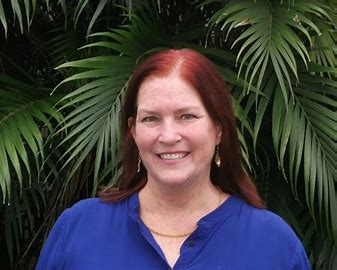
Research Highlights
Research Interests
Investigation of circulation, water properties, and connectivity in the Caribbean Sea, Gulf of Mexico, and south Florida coastal waters using a variety of interdisciplinary data.
Analysis of episodic oceanographic events such as red tides and black water intrusions, algal blooms, remote river plumes extremes in temperature and salinity, long-distance dispersal events, and their effects on regional coastal ecosystems.
Interdisciplinary studies of Caribbean reef fish larval abundance, distribution and diversity; large-scale oceanographic and meteorological events and their effect on marine ecosystems.
Studies of the circulation, transport, and watermass variability of the western boundary current system from the equator to Cape Hatteras, including the North Brazil Current, the Caribbean Current, the Loop Current, the Florida Current, the Antilles Current, and the Gulf Stream, as well as the Deep Western Boundary Current.
Elizabeth “Libby” Johns, Ph.D.
Oceanographer, Physical Oceanography Division
305.361.4360
4301 Rickenbacker Causeway
Miami, Florida 33149
“I believe that interdisciplinary oceanography is very important now and in the future, especially for physical oceanographers. Using physical oceanography principles and methods to solve biological, chemical, and fisheries-related ocean ecology mysteries is a fascinating and valuable endeavor.”
Dr. Elizabeth Libby Johns is an oceanographer at NOAA’s Atlantic Oceanographic and Meteorological Laboratory (AOML), in the Physical Oceanography Division (PhOD). She is currently engaged in interdisciplinary research to study the variability observed in over 20 years of data collected by AOML scientists and collaborators in Biscayne Bay, Florida Bay, and the coastal waters of the Florida Keys and southwest Florida shelf. Prior to this Dr. Johns published a study (Progress in Oceanography 2020) relating the arrival of Sargassum to the tropical Atlantic and Caribbean Sea in 2011 to wind forcing due to the extreme negative phase of the North Atlantic Oscillation (NAO) that occurred in winter 2009-2010.
Current Work
Dr. Libby Johns is currently using 24 years of shipboard survey data (1998-2021) in south Florida coastal waters including NOAA’s Florida Keys National Marine Sanctuary (FKNMS), Florida Bay, and Biscayne Bay, to analyze the means, climatologies, and variability of sea surface temperature, salinity, chlorophyll, and other parameters. This work provides a valuable baseline for these parameters to allow a better ability to detect future change, and will help other interdisciplinary south Florida researchers to put their observations in a quantitative oceanographic context.
Recently, Dr. Johns published a paper in Progress in Oceanography (2020) titled “The establishment of a pelagic Sargassum population in the tropical Atlantic: Biological consequences of a basin-scale long distance dispersal event”, which described how an anomalous wind event in the North Atlantic led to the recent Sargassum blooms in the tropical Atlantic and subsequent socioeconomically harmful Sargassum inundations on the beaches of the Caribbean Sea.
1976, B.A. English Literature, Mount Holyoke College, South Hadley, MA
1984, Ph. D. Oceanography, Univ. of Rhode Island, South Kingstown, RI
- Johns, E.M., R. Lumpkin, N.F. Putman, R.H. Smith, F.E. Muller-Karger, D. Rueda-Roa, C. Hu, M. Wang, M.T. Brooks, L.J. Gramer, and F. E. Werner. The establishment of a pelagic Sargassum population in the tropical Atlantic: Biological consequences of a basin-scale long distance dispersal event. Progress in Oceanography, 182:102269, https://doi.org/10.1016/j.pocean.2020.102269 2020
Ref. 3768 - Meinen, C.S., W.E. Johns, B.I. Moat, R.H. Smith, E.M. Johns, D. Rayner, E. Frajka-Williams, R.F. Garcia, and S.L. Garzoli. Structure and variability of the Antilles Current at 26.5°N. Journal of Geophysical Research-Oceans, 124(6):3700-3723, https://doi.org/10.1029/2018JC014836 2019
Ref. 3668 - Putman, N.F., G.J. Goni, L.J. Gramer, C. Hu, E.M. Johns, J. Trinanes, and M. Wang. Simulating transport pathways of pelagic Sargassum from the equatorial Atlantic into the Caribbean Sea. Progress in Oceanography, 165:205-214, https://doi.org/10.1016/j.pocean.2018.06.009 2018
Ref. 3553
NOAA’s Administrator’s Award 2017
For surveying Cuban waters and establishing a groundbreaking multinational Atlantic bluefin tuna research partnership with Cuban scientists.
Excellence in Partnering Award 2017
For contributions to the project entitled National Marine Sanctuaries at Sentinel Sites for a Demonstration Marine Biodiversity Observation Network.
US Department of Commerce Bronze Medal 2007
Western Boundary Time Series – Meridional Overturning Circulation Team
For long-term research, design and support of an observing system forthe Florida Current and the Meridional Overturning Circulation.